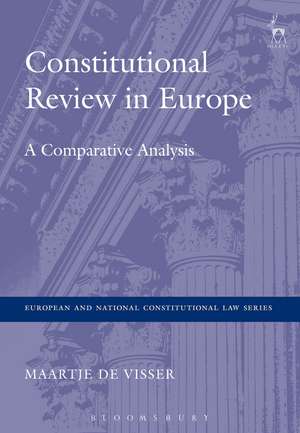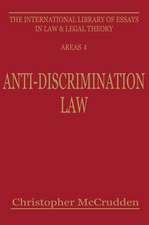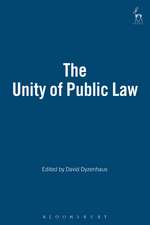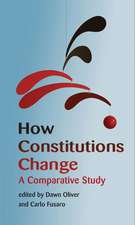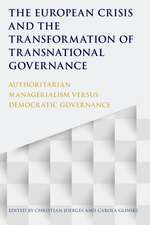Constitutional Review in Europe: A Comparative Analysis: European and National Constitutional Law Series
Autor Dr Maartje De Visseren Limba Engleză Paperback – 5 oct 2015
| Toate formatele și edițiile | Preț | Express |
|---|---|---|
| Paperback (1) | 268.52 lei 6-8 săpt. | |
| Bloomsbury Publishing – 5 oct 2015 | 268.52 lei 6-8 săpt. | |
| Hardback (1) | 842.11 lei 6-8 săpt. | |
| Bloomsbury Publishing – 21 noi 2013 | 842.11 lei 6-8 săpt. |
Preț: 268.52 lei
Preț vechi: 336.91 lei
-20% Nou
Puncte Express: 403
Preț estimativ în valută:
51.39€ • 53.20$ • 43.43£
51.39€ • 53.20$ • 43.43£
Carte tipărită la comandă
Livrare economică 06-20 martie
Preluare comenzi: 021 569.72.76
Specificații
ISBN-13: 9781849469715
ISBN-10: 1849469717
Pagini: 528
Dimensiuni: 169 x 244 x 30 mm
Greutate: 0.91 kg
Editura: Bloomsbury Publishing
Colecția Hart Publishing
Seria European and National Constitutional Law Series
Locul publicării:London, United Kingdom
ISBN-10: 1849469717
Pagini: 528
Dimensiuni: 169 x 244 x 30 mm
Greutate: 0.91 kg
Editura: Bloomsbury Publishing
Colecția Hart Publishing
Seria European and National Constitutional Law Series
Locul publicării:London, United Kingdom
Caracteristici
This book looks at who (should) uphold(s) the Constitution in 11 European countries and how constitutional review is organised.
Notă biografică
Maartje de Visser is an Assistant Professor of Law at the Singapore Management University. This book is the culmination of research carried out between 2008 and 2013 when Maartje was a member of the European and National Constitutional Law (EuNaCon) Project, funded by the European Research Council (ERC).
Cuprins
Introduction Introductory Definitions: Constitutional Interpretation and Constitutional Review Background: The Need for a Perspective Combining National and European Constitutional Law Objectives Method Terminology StructureChapter 1The Role of Non-Judicial Actors in Upholding the Constitution I. Introduction II. Councils of State and Chancellors of Justice III. Parliament and its Committees IV. Heads of State V. The People VI. Concluding Remarks Chapter 2The Rise of Constitutional Adjudication I. Introduction II. The Notion of 'Constitutional Jurisdiction' III. Exploring the Reasons behind the Rise of Constitutional Adjudication IV. Bucking the Trend? A Closer Look at the Approaches of the Netherlands and the United Kingdom V. Concluding Remarks and Some Brief Reflections on the Two European Courts Chapter 3Purposes of Constitutional Adjudication and Access to Constitutional Courts I. Introduction II. The Institutional Design of Constitutional Adjudication III. Four Purposes that May be Served by Constitutional Adjudication IV. Final Comparative Remarks and Reflections on the Court of Justice Chapter 4The Constitutional Bench I. Introduction II. Selection and Appointment Procedures III. Number of Judges and Eligibility Criteria IV. Tenure of Judicial Appointments and Termination Thereof V. Final Comparative Remarks and Reflections on the Court of Justice Chapter 5Identifying the Sources of Standards for Constitutional Review I. Introduction II. Belgium: Cour constitutionnelle III. Czech Republic: Ustavni Soud IV. Germany: Bundesverfassungsgericht V. France: Conseil constitutionnel VI. Hungary: Alkotmanybirosag VII. Italy: Corte costituzionale VIII. Poland: Trybunal Konstytucyjny IX. Spain: Tribunal Constitucional X. The Netherlands: Raad van State XI. United Kingdom: House of Lords Constitution Committee XII. Finland: Perustuslakivaliokunta XIII. European Union: Court of Justice XIV. Comparative Remarks Chapter 6Testing and Remedying Unconstitutionality I. Introduction II. Deference Rhetoric III. Theory of the Living Law IV. Constitution-Conform Interpretation V. Types of Judgment and their Effects VI. Concluding Remarks Chapter 7Interplay between Constitutional Courts and Other Actors I. Introduction II. Interactions between Constitutional Courts and (Constitutional) Legislatures III. Interactions between Constitutional Courts and the Ordinary Courts IV. Interactions among European Constitutional Courts V. Interactions between Constitutional Courts and the Court of Justice VI. Interactions between National Highest and Constitutional Courts and the European Court of Human Rights VII. Concluding Remarks
Recenzii
... a highly welcome contribution as a well-researched handbook for all those interested in comparative constitutional legal studies in the Member States and the EU constitutional legal order....it offers plenty of 'pistes de refléxion' in the concluding section of each chapter and assembles a very helpful sample of legislative, jurisprudential and institutional developments in a well-chosen array of constitutional regimes of the EU and EU Member States.
Ultimately, Maartje de Visser's comparative contribution to the exploration of the constitutional review issue should be warmly welcomed as an even-handed, lucidly written and insightful addition to the ever-swelling body of scholarship in this area. Whilst it may be easy to overlook the fact, the author has managed to construct, without superficiality and with well-paced order, a comprehensive and credible survey of constitutional review practices across Europe - a survey that is at once a heavy-duty piece of scholarship and a generally fascinating book.
This forward-looking work is a thrilling travel through a winding and disregarded road, always looking to balance the general overview and a necessary didactical division of the work through the analysis of eleven representative European Countries.
...this book is a veritable tour de force as it is a tour d'Europe.Comparative analysis of constitutional review from a neutral perspective encompassing eleven states and the EU, is a highly ambitious project, one that de Visser has achieved in accomplishing with great skill and eloquence. As the first volume in the series European and National Constitutional Law, we may look forward eagerly to the next volume, and hope that it will prove as engaging, diverse, and insightful as this book is. For any practitioners, academic or scholar of constitutional law it is a highly recommended read.
[T]his book should be considered the new compulsory starting point for anyone interested in any key aspect of the constitutional adjudicatory process, and wishing to be quickly able to rely on authoritative points of comparison. . [I]t is difficult not to be struck by the quality of the research undertaken and the subtle nature of the analysis developed by the author on the basis of an impressive bibliography.Written in an engaging style, which constantly holds the reader's attention, de Visser's monograph makes a decisive contribution to our understanding of the institution of constitutional review in Europe. There is little doubt that it will become a classic reference for the practitioners, academics and students of comparative constitutional law.
...definitely to be recommended to constitutional and EU law specialists as a major contribution to some of the most timely issues they have to deal with.
[The book] succeeds in presenting the plurality of different solutions in carefully chosen comparative systems...it should be read by lawmakers and the drafters of any legislation regarding constitutional court...[and] is a priceless tool for any teacher looking for examples in comparative law to help students better appreciate the logic(s) of constitutional review.
Ultimately, Maartje de Visser's comparative contribution to the exploration of the constitutional review issue should be warmly welcomed as an even-handed, lucidly written and insightful addition to the ever-swelling body of scholarship in this area. Whilst it may be easy to overlook the fact, the author has managed to construct, without superficiality and with well-paced order, a comprehensive and credible survey of constitutional review practices across Europe - a survey that is at once a heavy-duty piece of scholarship and a generally fascinating book.
This forward-looking work is a thrilling travel through a winding and disregarded road, always looking to balance the general overview and a necessary didactical division of the work through the analysis of eleven representative European Countries.
...this book is a veritable tour de force as it is a tour d'Europe.Comparative analysis of constitutional review from a neutral perspective encompassing eleven states and the EU, is a highly ambitious project, one that de Visser has achieved in accomplishing with great skill and eloquence. As the first volume in the series European and National Constitutional Law, we may look forward eagerly to the next volume, and hope that it will prove as engaging, diverse, and insightful as this book is. For any practitioners, academic or scholar of constitutional law it is a highly recommended read.
[T]his book should be considered the new compulsory starting point for anyone interested in any key aspect of the constitutional adjudicatory process, and wishing to be quickly able to rely on authoritative points of comparison. . [I]t is difficult not to be struck by the quality of the research undertaken and the subtle nature of the analysis developed by the author on the basis of an impressive bibliography.Written in an engaging style, which constantly holds the reader's attention, de Visser's monograph makes a decisive contribution to our understanding of the institution of constitutional review in Europe. There is little doubt that it will become a classic reference for the practitioners, academics and students of comparative constitutional law.
...definitely to be recommended to constitutional and EU law specialists as a major contribution to some of the most timely issues they have to deal with.
[The book] succeeds in presenting the plurality of different solutions in carefully chosen comparative systems...it should be read by lawmakers and the drafters of any legislation regarding constitutional court...[and] is a priceless tool for any teacher looking for examples in comparative law to help students better appreciate the logic(s) of constitutional review.
Descriere
This book offers a comprehensive, comparative analysis of how 11 representative European countries tackle the questions of who (should) uphold(s) the Constitution and how constitutional review is organised.
